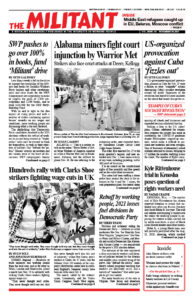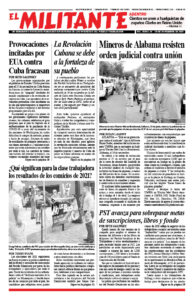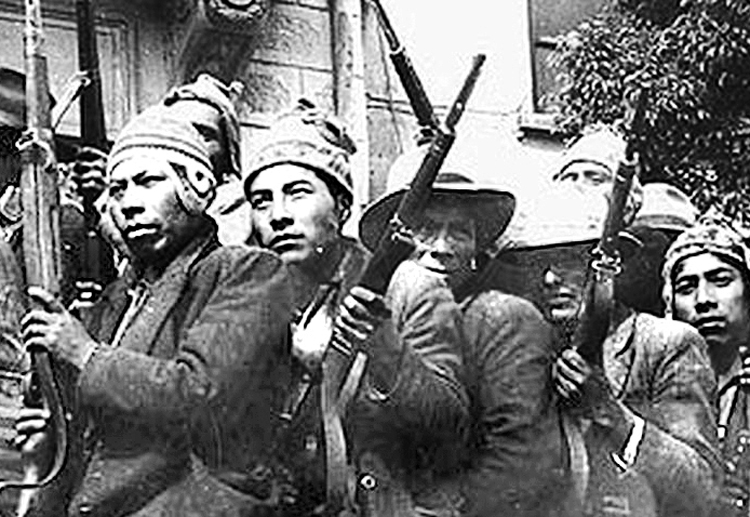Pombo: A Man of Che’s guerrilla: With Che Guevara in Bolivia 1966-68 by Harry Villegas is one of Pathfinder’s Books of the Month for November. Villegas became a combatant in the Rebel Army of the Cuban Revolution led by Fidel Castro, fighting much of the time in a column commanded by Argentinian-born Guevara. He later served under Che in Cuba’s internationalist campaigns in the Congo and Bolivia, where he became known by his nom de guerre, Pombo. The revolutionary fighters in Bolivia were betrayed by the Stalinist Communist Party. The excerpt is from the introduction. Copyright © 1997 by Pathfinder Press. Reprinted by permission.
In his 1966 “Message to the Tricontinental,” Che made a thorough and deep-going analysis of this policy of imperialist domination. At the same time he expounded, in all their strategic and continental dimensions, his anti-imperialist ideas and course of action that by then were already being put into practice through his own personal example. In that message, Che proclaimed: “Our every action is a battle cry against imperialism and a call for the unity of the peoples against the great enemy of the human race: the United States of North America.”
This deep conviction of the Heroic Guerrilla concerning the role played by the United States was rooted in the innumerable acts of imperial aggression that make up the history of contemporary colonialism and neocolonialism in this hemisphere. To mention only a few examples of bloody interventions in our century, there are the cases of Mexico, Guatemala, the Dominican Republic, Panama, Haiti, and Cuba.
The continent as a whole has experienced the varied forms through which this imperialist policy has been systematically implemented. Neocolonialism has left its imprint of economic and political domination and deep social crisis, with its resulting hunger, poverty, unemployment, marginalization, and devastation. An entire region has been ravaged by foreign control over its natural resources and products, the exploitation of its workers, and the sharp impoverishment of its economies. Tribute is exacted in ways that violate the sovereignty of the nations of Latin America, pillage their material and spiritual patrimony, deepen their dependence and subjugation to imperialism, and close off possibilities of development and progress.
Together with a handful of heroic Bolivian, Peruvian, and Cuban combatants who accompanied him to Bolivia, Che fought to change this reality of the 1960s — a reality whose cruel mechanisms of plunder have since been deepened. …
Che’s dream was the dream of [José] Martí and [Simón] Bolívar. In elaborating his strategy, given the struggles already under way in different countries of the continent, Che envisioned the possibility of forming a guerrilla nucleus, a mother column that would pass through the necessary and difficult stage of survival and development. Later on it would give birth to new guerrilla columns extending outward toward the Southern Cone of Latin America, giving continuity to a battle that would become continent-wide in scope. He took into account the experience of the mother column in Cuba’s Sierra Maestra mountains, which gave rise to new guerrilla columns and fronts, culminating in the defeat of the Batista dictatorship and the victory of the Cuban revolution.
Totally convinced that the political conditions were ripening and that this perspective was realizable, Commander Che Guevara carried out his plans and initiated actions to open a path toward victory. In his view, victory was certain to the degree that the struggle extended as far as possible throughout Latin America.
Never has such a small group of individuals undertaken an enterprise of such gigantic proportions. That small detachment of heroic combatants was Che’s “sling of David.” As our commander in chief [Fidel Castro] pointed out, Che did not outlive his ideas, he enriched them with his blood. …
[G]iven the confrontation unfolding in Latin America at the time, Che chose Bolivia as the place from which to initiate his strategic course in Latin America.
One factor behind Che’s selection was his analysis of the Bolivian people’s combative traditions going all the way back to the fight of the indigenous peoples against the [Spanish] royalists. … Students, peasants, miners, and workers all fought heroically, under the noteworthy leadership of the Central Organization of Bolivian Workers (COB), against the new version of the conquistadors, and the growing poverty, misery, and marginalization of the majority of the people. Bolivia’s geographic characteristics and continental location figured in the selection. …
The diary also reflects the firm conviction and internationalist fervor of our efforts for the national liberation of Latin America, as well as the real possibilities that existed for achieving that objective. The diary reflects our conviction that the struggle we were initiating would increasingly widen those possibilities. The precondition for this was to overcome the hard and difficult stage in which the guerrilla unit struggled to survive, in order to develop later on along the lines conceived by Che.
We never envisioned a sectarian undertaking. Such a conception would have been impossible not only on a Bolivian scale, but above all on a continental scale. Our idea was to create a broad revolutionary movement that would draw in all honest individuals prepared to struggle for social justice, together with all revolutionary organizations, parties, and sectors of the people. This was the basis on which the ELN (National Liberation Army) was formed, as is made clear by its five public communiqués, containing information and appeals addressed to the Bolivian people. …
[I]n Che’s Bolivian diary and in my own, one can see how relations were established not only with different political forces within Bolivia and their representatives, but also with leaders and representatives of other political organizations of the continent. These contacts and relations would inexorably lead to an expansion of ties with other progressive forces in the region provided that the struggle intensified and succeeded in surviving the initial phase.


